Gummy smile treatment
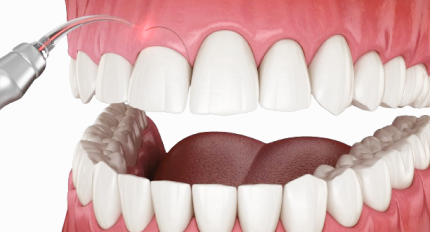
Lasers are used to reshape gum tissue associated with gummy smiles. It’s a condition in which the gum length exceeds and covers much of the tooth.
On this Page ↓
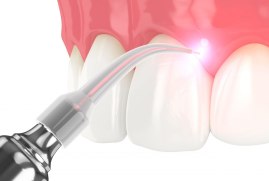
LASER stands for Light Amplification by the Stimulated Emission of Radiation. The instrument creates light energy in a very narrow and focused beam. This narrow focused beam produces a reaction when it hits the tissue, allowing it to remove or shape the tissue.
Nowadays, a variety of dental diseases are treated with lasers in dentistry. Compared to drills or other non-laser instruments, it has provided a more comfortable treatment option for some dental operations involving tissues.
Numerous operations can be performed with laser dentistry, such as:
• Treating hypersensitivity
• Treating gum diseases
• Treating gum pigmentation
• Treating tooth decay
Here’s why Clove Dental is the best in laser dentistry across the nation.

Best Laser
Dentistry Equipment

Best Laser
Specialists in India

Laser Dentistry Available
in 650+ Dental Clinics

Laser Dentistry
in 27 Cities
Laser Dentistry is a cutting-edge method to dental care that has numerous advantages over traditional procedures. We are happy to provide this state-of-the-art equipment in our office to enhance your dental visit.
Here’s why laser dentistry might be the right choice for your next dental procedure:
Modern, efficient dental care is offered by laser dentistry, which covers everything from straightforward operations to more complex treatments. You will receive exceptional care because our personnel have undergone significant training in these techniques.
Inquire with us about the advantages of laser dentistry, regardless of whether you’re seeking treatment for a simpler procedure or something more involved. Discover the dental care of the future now!
Some of the most commonly performed procedures in Dentistry include:

Gummy smile treatment

Lasers are used to reshape gum tissue associated with gummy smiles. It’s a condition in which the gum length exceeds and covers much of the tooth.
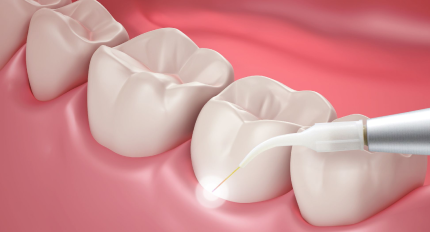
Crown Lengthening

This procedure is used to reshape both gum tissues and bones for healthier tooth structure. This helps in removing excess gum tissue and sometimes bones around the upper teeth to make them appear longer.
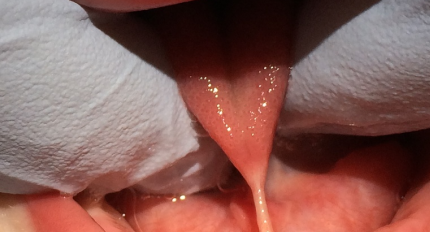
Treating tongue frenulum attachment

Helps in correcting restricted frenulum in children, which leads to tongue-tie. It presents difficulties in breastfeeding and also speech impediment in some.
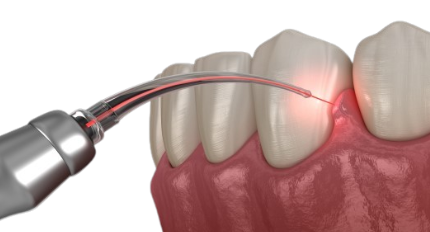
Removing soft tissue folds

Lasers can easily remove soft tissue folds from ill-fitting dentures without any pain or sutures.
Laser treatment cost varies as per the procedure being done and the laser equipment being used. When compared with non-laser treatment, they tend to be a little expensive as the treatment is completed in fewer sessions.
Preparation:
During the Procedure:
Post-Procedure Care and Recovery:
| Aspect |
Traditional Methods |
Laser Dentistry |
|---|---|---|
| Pain | Can cause discomfort due to vibrations; often requires anesthesia | Generally pain-free; fast and effective |
| Bleeding | More likely to cause bleeding during treatments | Promotes immediate blood clotting; minimal bleeding |
| Recovery | Slower tissue regeneration; wounds may take longer to heal | Faster tissue regeneration; quicker healing of minor wounds |
| Bacterial Infections | Takes time to resolve; may require multiple appointments | Sterilizes the infected area with heat; more accurate removal of infections |
| Anesthesia | Often required | Often unnecessary |
| Sutures | Frequently needed for soft tissue procedures | Decreased need with soft tissue lasers |
| Damage to Surrounding Tissues | More likely | Less damage to surrounding tissues |
| Swelling | More common | Negligible swelling in most cases |
| Sterilization | Standard sterilization methods | Laser sterilizes the area, lowering infection risk |
| Overall Patient Experience | Can be uncomfortable | Generally more comfortable |
| Versatility | Limited to specific tools for each procedure | One tool can perform a wide range of treatments |

From consultation to treatment, everything was smooth and painless. The dentist was gentle and very knowledgeable. I’m extremely happy with the results of my treatment. Would definitely recommend to friends and family.

Great work by Kawaldeep mam. Made me feel so comfortable and done great work in deep clean and laser treatment. Highly recommended.

Clove Dental Kaushambi offers complete specialist care with modern equipment, 10x safety protocols, and painless treatments. A one-stop clinic for all dental needs.
Q.1. What Is Laser Dentistry Used For?
Laser dentistry uses:
Q.2. Does Laser Dentistry Hurt?
Laser dentistry usually hurts less than traditional methods. Patients often need less or no anesthesia.
Q.3.How Does Laser Dentistry Work?
It uses focused light beams to treat dental issues. Lasers can vaporize or shape tissue precisely.
Q.4. Is Laser Dentistry Better?
Laser dentistry can be better because it’s more precise, comfortable, and promotes faster healing. But traditional methods may still be needed sometimes. Whether laser dentistry is “better” depends on the specific procedure and the patient’s individual needs. It’s essential to consult with a dentist to determine the best treatment approach for your specific dental needs.
Q.5. How Do Lasers Work for Frenectomies?
For frenectomies, lasers cut and seal tissue under the tongue or lip. This reduces bleeding and speeds healing.
Q.6. Is Laser Treatment Only for Adults?
Laser dentistry works for all ages, including kids.
Q.7. Is Laser Dentistry Safe?
It’s safe when done by trained professionals. Dentists must follow safety rules and use eye protection.
Q.8.Are Lasers Painful?
Lasers typically cause little to no pain during dental procedures.
Q.9. Can Laser Dentistry Prevent Tooth Extraction?
Laser dentistry may sometimes prevent tooth extraction by treating gum disease, cavities, or infected roots early.
Q.10. Is Laser Dentistry more expensive?
Costs vary, but laser treatments can be pricier due to equipment and training costs.
Q.11. How do I know my dentist has received the necessary training to utilize a laser?
Inquire about your dentist’s credentials, experience, and prior laser treatment cases to determine whether or not they have received any training.
Q.12. Is anesthetic needed with Laser treatment?
Anesthesia needs vary. Many laser procedures need little or no anesthesia, but some may still require it.
Q.13. Are there any negative Laser side effects?
Possible side effects include tissue damage, temporary sensitivity, and infection risk if not done properly. Choosing an experienced dentist helps reduce risks.
Q.14. How long does the Laser treatment last?
The length of a laser dental operation varies based on the particular technique and level of complexity. Treatments with lasers are typically quicker than with conventional techniques. While more complicated treatments could take up to an hour, simpler ones might only take a few minutes. During your consultation, your dentist can give you a more accurate quote for the specific treatment you need.
Q.15. Can a Laser help with dental phobia?
Because laser dentistry does not require the use of traditional, potentially frightening instruments and does away with the noise made by dental drills, it may be less frightening for patients who are afraid of the dentist. Lasers’ more accurate and quieter operation might make going to the dentist more soothing and relaxing.

Also, learn more about all available dental specialties and treatments at Clove Dental here.
Clove Dental clinics are Available in 27 Indian Cities. Book an appointment at Clove Dental Clinics for the best dental treatments by expert dentists/orthodontists for Laser Dentistry at a reasonable cost. Select your city below to find the